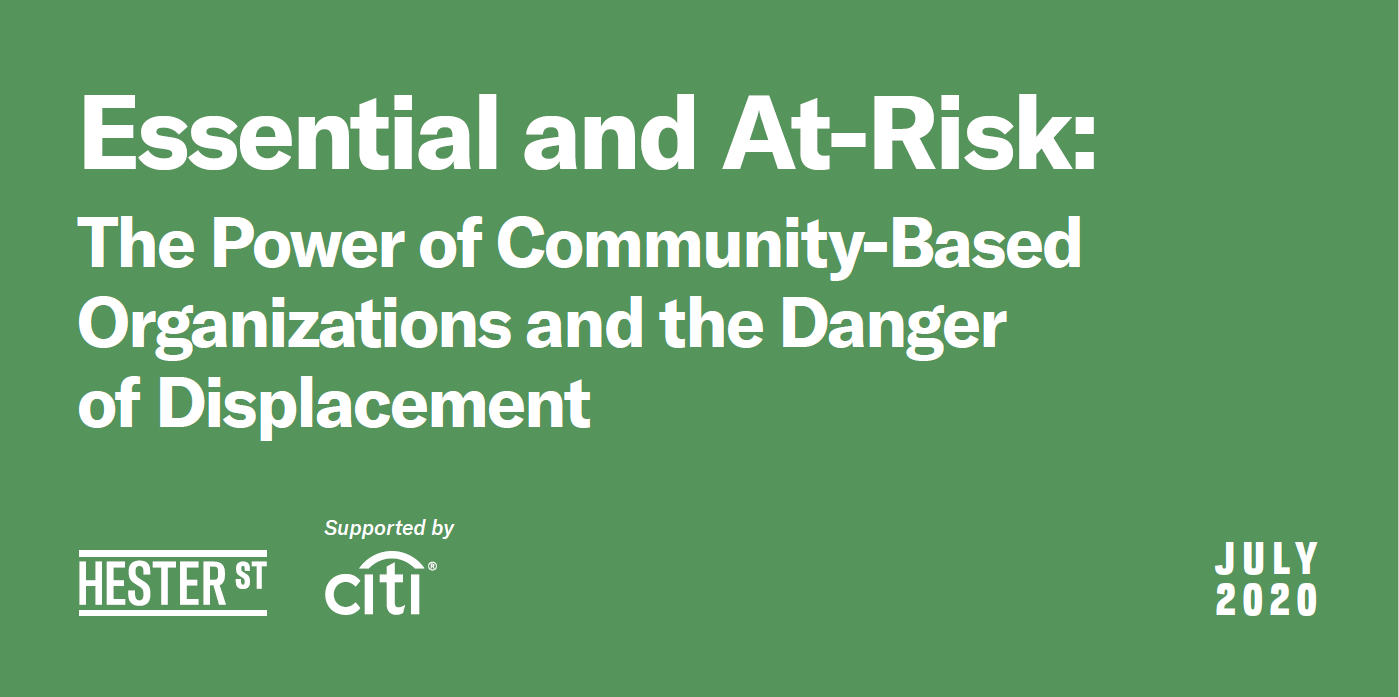Download the full report here.
Hester Street’s new report recommends changes to the NYC Capital Grants Program (CapGrants)—which provides city funding for projects that improve properties being used to serve New York City—to ensure nonprofit community-based organizations (CBOs) can establish long-term, stable physical sites in the neighborhoods they serve.
The report, “Essential and At-Risk: The Power of Community-Based Organizations and the Danger of Displacement”, draws on recent data to establish CBOs as essential place-based providers of community organizing, education, food, housing, and other social services in high-need neighborhoods. Demand for these crucial services is projected to increase as low-income communities contend with the COVID-19 crisis and its aftermath. At the same time, CBOs confront tighter budgets due to the economic downturn created by the pandemic.
Even before the COVID-19 outbreak, in 2018, 86% of nationwide nonprofit leaders said demand for their services was rising, and 57% said they could not meet that demand. Among non-profits that served low-income communities, 65% said they could not meet increasing demand. CBOs in low-income communities face the additional threat of displacement— surveys show that close to 80% expressed being moderately to highly concerned about the cost of rent on their organization’s long-term financial sustainability. The report finds that, for these CBOs, ownership represents the chance to lower operating costs and secure financial stability and long-term sustainability.
In order to create an easier path for CBOs to own their program and office spaces, the report recommends changes to the NYC CapGrants program, which provides funds for the private and sole ownership of property of individual CBOs. Of CBOs surveyed that had applied for CapGrants, 63% experienced challenges in the application, 31% in contract review, 44% in project implementation and 31% in the disbursement phase. Challenges ranged from technical barriers to communication with the City, legal requirements, increased costs and delays from the time of application to allocation or disbursement.
“In midst of the COVID-19 crisis, our city’s community-based organizations are more crucial than ever. CapGrants is one of the very few funding sources available for community facility development. Unfortunately, the program adds exorbitant time and expense to projects that are already operating on thin margins. And because it’s so hard to access, it is only realistically available to very few large, well-connected CBOs,” said Betsy MacLean, Co-Executive Director, Hester Street. “Our hope is that the City takes notice of these recommendations and adjusts the CapGrants program, allowing more CBOs to take advantage of the City’s investment in NYC neighborhoods — particularly in low-income communities of color.”
“Community-based organizations are often the lifeblood of their neighborhoods, delivering critical services and connecting economically vulnerable residents to opportunities that bolster their stability and well-being,” said Gregory Schiefelbein, New York Tri-State Director, Citi Community Investing and Development. “Faced with rising rents and continued high demand for services, we must help nonprofits stay rooted in their communities for the long-term by strengthening pathways to ownership.”
Key recommendations outlined in the report include:
– Prioritize CBOs – essential social infrastructure – the City should invest in long-term neighborhood resilience through community ownership.
– Make the CapGrants program accessible to more CBOs – especially those in outer boroughs that serve low-income communities of color.
– CapGrants funding should come in at acquisition or construction closing – like in affordable housing deals. As a reimbursement grant, it adds unnecessary time and expense to projects operating on tight margins.
– Treat CBOs like small businesses and implement commercial lease protections.
– Examine the impact on CBOs of major land use actions, like re-zonings.
– Philanthropy and private lenders should mobilize and invest in long-term CBO sustainability through pre-development, acquisition and construction grant and low-interest or no-interest funding.
Read press coverage of the report in Crain’s NY and AM New York and watch the full video from our report release and virtual discussion event below.


